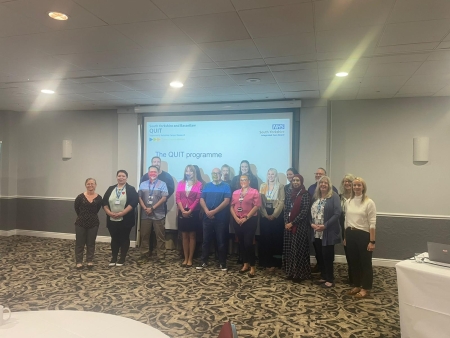
Thousands of South Yorkshire residents have been supported to stop smoking thanks to the innovative QUIT programme in our region’s hospitals.
Developed in partnership with NHS South Yorkshire and Yorkshire Cancer Research, the South Yorkshire QUIT Programme embeds treatment for tobacco addiction into the routine care offered to every patient who smokes attending any hospital in South Yorkshire.
On Thursday 19 September, NHS South Yorkshire and Yorkshire Cancer Researched hosted a celebration event that brought together key partners to celebrate the successes of the programme so far, highlighting how QUIT has helped to reduce health inequalities and helped thousands of patients and staff in South Yorkshire to reduce or quit tobacco consumption.
Dr Richard Jenkins, CEO of Barnsley Hospital and Rotherham Hospital and Clinical Lead for QUIT, said: “In South Yorkshire, nearly 200,000 people smoke or use tobacco products. More than half of those people will die prematurely from smoking-related illness, losing on average 10 years of life. This is preventable and is why QUIT is such an important programme of work, the programme means we can now start to support people to stop smoking while they are in our hospitals and, by working together with our local community services, we can ensure that this support is continued once they leave hospital.
“Since the launch of QUIT, over 200,000 patients have been screened for smoking and over 17,000 smokers had a specialist assessment including nicotine replacement therapy recommendation. These are amazing figures and we predict that these continue to rise as the programme continues.”
Despite having effective treatments to treat tobacco addiction, smoking is still the biggest cause of preventable early death in South Yorkshire. The NHS has responsibility to treat smoking just as we would other diseases and treating tobacco addiction is one of the most effective treatments that the NHS can offer. Hospitals are in an ideal position to start people’s treatment for tobacco addiction.
When a patient is admitted to hospital they are asked their smoking status. Patients who are smokers are then referred to the in-house QUIT team who meet them to advise and support patients on how to reduce and stop their smoking and will offer nicotine replacement therapy. Patients are given the option of onward referral to the Community Stop Smoking service for ongoing support to becoming smokefree.
The QUIT programme also offers smoking support to staff working in hospitals.
At the event on 19 September, attendees heard about some of the success stories from QUIT. Alwyn from Barnsley smoked a cigarette every 5-10 minutes. He was introduced to Steve from the QUIT team after a stay in hospital, thanks to the support from the team, he has now stopped smoking cigarettes and now has the energy to undertake his hobbies again. Alwyn says: “I wouldn’t have done it on my own, I’ve tried and only lasted two weeks. Steve made it forever.” You can watch Alwyn talk about his journey here.
Attendees also heard Helen’s story, Helen is a nurse from Sheffield who stopped smoking thanks to the help of Gemma from the QUIT team where she works at Sheffield Teaching Hospitals. Stopping smoking means Helen feels and looks healthier and has been on holiday with the money she saved by not buying cigarettes. You can watch Helen’s story here.
Paul Lambert, Head of Services at Yorkshire Cancer Research, said: “The QUIT programme provides clear evidence that embedding smoking cessation services into hospitals has a transformative impact on people's lives. While smoking rates are steadily declining in Yorkshire, there are still many areas across our region where rates of smoking, and smoking-related cancers, are higher than the national average. That’s why ground-breaking programmes like QUIT are essential, so more people in Yorkshire have access to the tools and resources they need to successfully stop smoking and can go on to live longer, healthier lives.”
QUIT is the first programme of its kind and has received national recognition and has been used as a learning model for other areas.
Read more South Yorkshire QUIT success stories here.
